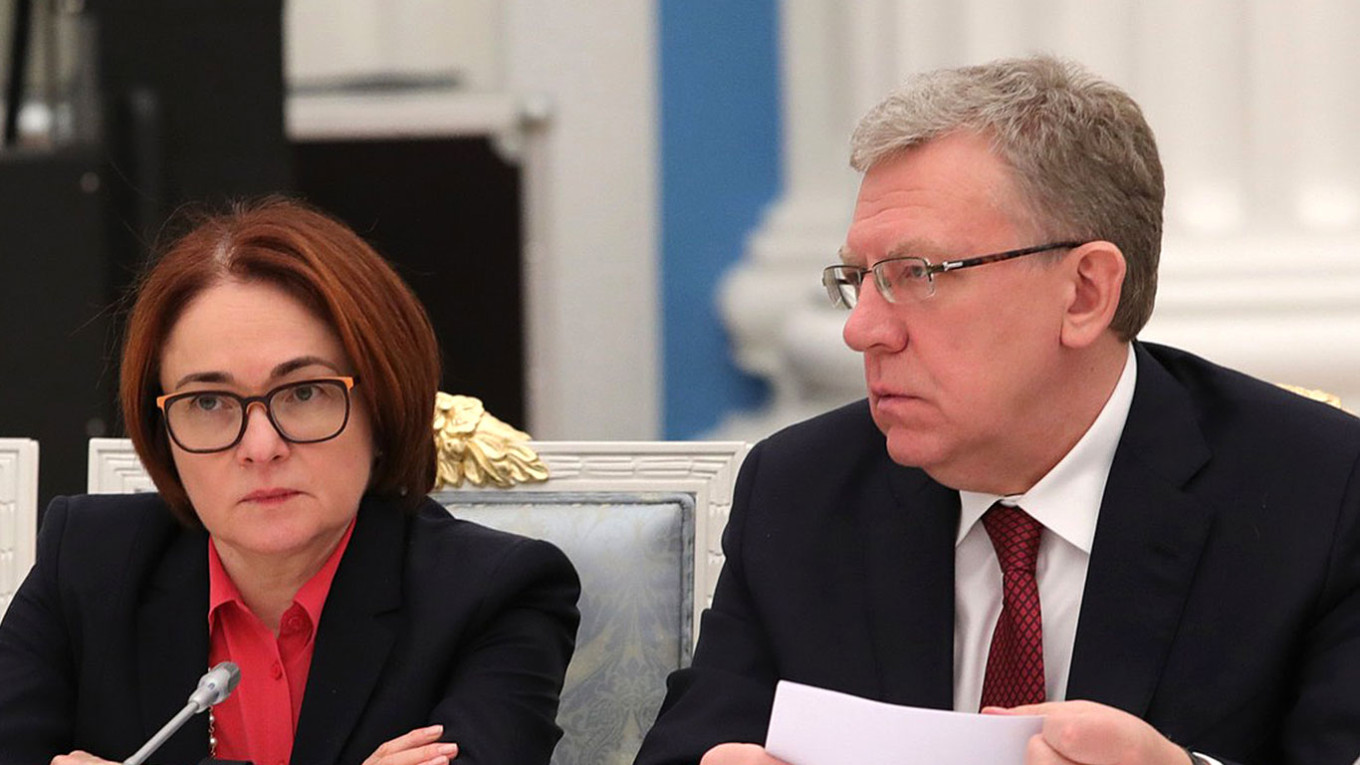Ever since their country invaded Ukraine, there has been a deafening silence from the group of Western-educated technocrats who are in charge of running Russia’s economy. Former finance minister Alexei Kudrin, Sberbank chief executive German Gref, central bank head Elvira Nabiullina, and all the other apolitical technocrats refrain from public criticism, remaining a convenient asset for Russian President Vladimir Putin.
They are successfully steering the Russian economy through the current turmoil, all while studiously avoiding anything political. As a result of their efforts, the Russian financial system remains relatively stable despite mounting sanctions, while the country’s GDP is declining gradually instead of an initially expected collapse. It seems they can tackle the self-made crisis caused by Russia’s invasion of Ukraine even while ignoring its cause.
The young professionals in the presidential administration, government bodies, and ministries fighting to save the Russian economy from the problems caused by the country’s aging leadership are the country’s new elite. Fluent in foreign languages and well versed in modern management methods, only a few of them quit their posts and went abroad following the outbreak of war. The vast majority continue to do their jobs, having accepted the new rules of the game.
The fashion for hiring young talent with good English and practical skills instead of the usual party loyalists or security service officers began long ago with Gref, when he was appointed economic development minister back in 2000. This is the origin story of Nabiullina, former deputy prime minister Arkady Dvorkovich, consumer rights watchdog head Anna Popova, and other government figures. Gref then famously continued his managerial revolution after moving to head up the state-owned Sberbank.
Still, the drive to introduce best managerial practices in Russia failed to solve the main problem of Russian state administration: the lack of a transparent system for formulating and evaluating performance indicators. The main criterion for success remains praise from Putin himself, or from someone else in the power vertical. And the leadership gives praise when officials get the job done, no matter how ethically.
What’s more, the leadership understands perfectly well that quite often the task set cannot possibly be solved while abiding by the current rules. A subordinate will never be directly ordered to break the rules: they may even be reminded of the importance of adhering to them. But when a resourceful and efficient employee achieves the desired result, they will not be asked how they did it, while the employee who points out that the task is impossible will be dismissed.
In this system, excessive reflection and compunction are, if anything, a distraction from focusing on the result, and therefore a disadvantage. Efficiency and loyalty are the two main criteria for success.
The Russian system of state administration is riddled with informal practices that do not get taught in management courses: businessmen close to the Kremlin bypass bureaucratic procedures to get presidential approval directly; the Federal Security Service (FSB, a successor agency to the KGB) might have its own opinion on an economic issue; and so on.
The young technocrats learn these informal practices from their senior colleagues once they start work and become part of the social group of federal civil servants, at which point they also become outsiders to all the other social groups. This is a key moment in the formation of their identity. The main defining characteristic of organized groups of outsiders is the feeling that they are set apart and that they are all in the same boat. A subculture is formed that includes a more relaxed view of moral standards.
The moral career of a technocrat has several stages. The first is not shying away from these informal practices, and, instead, after gaining experience with them, starting to rationalize them, such as by saying that people in other social groups do far worse things.
The next stage is actually taking part in these informal practices, at least partially, while considering that to be appropriate at a strictly defined time and place. During this period, commonly accepted moral beliefs stop being applicable to work.
“Once, while waiting for a meeting to start, we were discussing building a road and what a pain it was to requisition land for construction. At first, such talk seemed a bit barbaric, but then I got used to it. It’s only a job, at the end of the day. And it’s not like we’re taking it for ourselves: it’s for the people,” one deputy minister recalled.
At the third stage, this way of thinking becomes seen as the right way, because other members of the federal civil servant social group see it the same way. There’s also an element of whataboutism: “officials in other countries do exactly the same thing.”
The previous decade saw a trend of people giving up their jobs in business and consulting to go to work for the state, motivated by a genuine desire to enact change for the better. They knew when they made the switch that they would face various moral compromises, but each one was seen as a necessity in order to continue their career progression, maintain their standing, and do some good by remaining efficient.
This habit of efficiency goes a long way to explaining why most of the technocrats are reluctant to quit their posts and publicly denounce the war. “Just by paying taxes, we all support state policy one way or another. The choice is either to leave [Russia], or to continue to do your job,” one technocrat told the Bell.
Some civil servants believe that by remaining in their posts, they can at least make sure that life does not get worse for Russians, thereby possibly making amends for their silence on the war. “It’s practically impossible to influence anything while remaining in Russia but outside the system of government,” said another official. “Naturally, I don’t influence anything much from here either in the grand scheme of things, but I am close to the action, and perhaps one day I might find myself in the right place at the right time to make a difference.”
The focus on efficiency extends even to the “special military operation” itself. Instead of judging it from a moral point of view, the technocrats view it in terms of efficiency, or lack thereof. “Those ham-fisted blockheads could be more careful and humane, of course: they could look out for civilians, watch where the missiles are coming down, and time the bombardments more carefully,” said one.
“The old man [Putin] is an idiot for getting us into this. God only knows what he was thinking. But what can we do now?” commented another.
None of the people spoken to for this article supported the invasion of Ukraine. But nor were any of them prepared to publicly state their opposition. “It won’t change anything or help anyone. And I’d be scared: what if they put me in prison?” asked one.
The Russian Security Council meeting on Feb. 21, just a few days before the invasion, showed just how the decisionmaking system has changed in Russia. The collegial-consultative model in which the opinion of the president’s entourage was considered important, sometimes even definitive, has given way to a situation in which all decisions are made by one person only: the president.
There is no longer any need to be oriented by the public mood, nor by that among the ruling elites, and Putin’s favor is bestowed on anyone who is prepared to anticipate his wishes and carry them out unswervingly. There is no shortage of such people working within the state apparatus. The new rules of the game don’t appear unreasonable to the technocrats; their professionalism is replaced by loyalty.
And so now we see them coolly signing laws forcing businesses to become involved in the special operation, setting out the parameters for military mobilization, and agreeing to serve a tour in the military administrations of occupied parts of Ukraine.
The problem is that it’s impossible to be efficient amid the moral and institutional smoldering ruins left by the war. Any success will be short-lived. In the end, the technocrats face a growing deficit of resources followed by disappointment and, ultimately, radicalization.
A Message from The Moscow Times:
Dear readers,
We are facing unprecedented challenges. Russia's Prosecutor General's Office has designated The Moscow Times as an "undesirable" organization, criminalizing our work and putting our staff at risk of prosecution. This follows our earlier unjust labeling as a "foreign agent."
These actions are direct attempts to silence independent journalism in Russia. The authorities claim our work "discredits the decisions of the Russian leadership." We see things differently: we strive to provide accurate, unbiased reporting on Russia.
We, the journalists of The Moscow Times, refuse to be silenced. But to continue our work, we need your help.
Your support, no matter how small, makes a world of difference. If you can, please support us monthly starting from just $2. It's quick to set up, and every contribution makes a significant impact.
By supporting The Moscow Times, you're defending open, independent journalism in the face of repression. Thank you for standing with us.
Remind me later.








